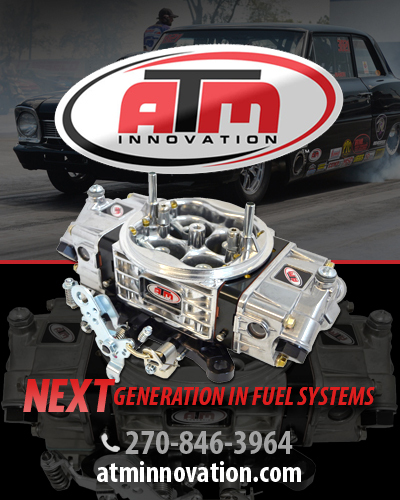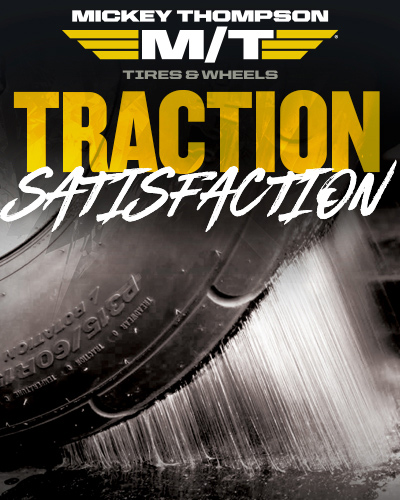EXCLUSIVE INTERVIEW - BILL BADER JR. DISCUSSES DECISION TO CLOSE NORWALK FOR 2020
 Bill Bader Jr. is so well in tune with the trends of operating a drag racing facility that he expected a strong 2020 season earlier in the year. He understood the ebbs and flows of the drag strip marketplace.
Bill Bader Jr. is so well in tune with the trends of operating a drag racing facility that he expected a strong 2020 season earlier in the year. He understood the ebbs and flows of the drag strip marketplace.
What he didn't understand back in March 2020 was the impact a global pandemic could have on drag racing. It presented the second-generation track owner and promoter a challenge the likes of which he couldn't have prepared for.
CompetitionPlus.com Publisher/Editor caught up with Bader just moments after he made the decision to cancel the 2020 season to ask him about the challenges and emotional heartbreak of throwing in the towel, and more.
COMPETITION PLUS - Bill, from somebody who has poured their heart, their soul, and everything into Norwalk Raceway Park, this had to be one of the most painful decisions you ever made.
BILL BADER JR. - It was the most excruciating decision I've ever made ... to suspend or cease operations for an entire race season. It is perhaps unprecedented, and there was no guide book or manual over the course of the last 12 weeks, 11 weeks, whatever it's been. This all started the middle of March and here we are the beginning of June with really no more clarity than we had a month ago or two months ago. And I guess at the end of the day, what it came down to was self-preservation when it became clear that all I could do was lose more money this year.
At that point, I guess you have to set your intensity, your passion, your principles, if you will, you check them and a pencil guides your decision. And the numbers are the numbers, and they don't lie. And I need to get to April 2021. And the best way for me to do that was to control all the variables. And by closing, I'm not reliant on any government entity, I'm not subjected to any type of scrutiny or compliance, or I can keep everyone safe. No one can claim or trace contracting this virus to Summit Motorsports Park. It allows me to stay small with a staff of three. I can maintain my facility. I can do everything I need to do. And if God sees fit, we open next April bigger and better.
CP - You made your announcement in mid-April that you were going to open regardless of what statutes were in place. I know this is tough for you to admit, but did you underestimate the situation when you made that comment?
BB - When I said that, I believed it and I was fully intent on doing exactly what I said I was going to do. I underestimated the reaction from partners. I underestimated some of the insurance parameters. I came to realize that if we open against a stay at home order, I am actually committing an illegal act, and I was made aware that in so doing, I could be jeopardizing my insurance and giving the insurance company a reason to walk away from a catastrophic incident. Not from a COVID outbreak, but from a catastrophic on-track incident or a pit vehicle accident in the pits. And then some attorney walks up and down my race track and names me and every one of my partners in a lawsuit. Those were the things that slowed me down.

CP - Hindsight being 20/20, is that a statement you wish you had never made?
BB - Well no, I'm going to stand by what I said. I was speaking from my heart, and I was certainly on the chip, so to speak, I was passionate. I do feel very betrayed by my country. Unless someone has been deemed not essential, which means in the United States of America, you are not permitted to earn a living, which is what nonessential means. Until you've been burdened with that, you cannot possibly understand what that means or how that feels. I have received no financial assistance. I had plenty of well-wishers. I had lots of folks in my corner, but no one could help me make anything happen. So I was pretty much adrift and fighting for my life.
So do I regret that? No, I meant that. No, I don't. I am not going to hide behind anything. At the time, I meant that I didn't understand the stakes. I didn't understand the consequences. But I said it, and I will not hide from it.
CP - The decision to close for the balance of 2020. Well, you never really opened. The decision to close for 2020, has that cost you? Obviously, it's cost you financially, but did it cost you in terms of long-term relationships and other areas?
BB - No, at least not that I'm aware of. I hope it hasn't. I hope our body of work speaks for itself. This is something beyond everyone's control. No one could have predicted this. No one could have prepared for it. I do blame myself for not being better prepared for it. And even though people say, "Bill, you couldn't have anticipated it."
I'm smart enough that I should have been able to prepare. When you're in this business, you have to be nimble. You have to be agile. You've got to be flexible. And we plan for every scenario.
Think about it, Bobby. We, one year in advance, release a schedule that has an incredible lineup that costs a fortune to produce. And we hope it's not going to rain. We hope that we won't be thrust into a recession or depression or some type of who knows what can happen in 12 months in such a dynamic landscape. So we assume the risk, and we have contingency plan after contingency plan. And I should have had a plan for this. So I do assume responsibility for it, but it would've cost me. On paper, it will cost me more to open than it will to remain closed.
CP - As a track promoter, how could you prepare for something that the President or the US Government couldn't have prepared for? Don't you think you're holding yourself to an unattainable status?
BB - My degree is in accounting and corporate finance. My grandmother lived through the depression and I watched her save every dime. I watched her reuse tinfoil 10 times. I watched her use cellophane bags 50 times. I watched her waste nothing. Unless you live through something, it's very difficult to truly, at its very core, understand human behavior. When I was deemed not essential and I had to let 23 people that I dearly love go, and I watched everything our family worked for go up in smoke, and I realized that I could no longer draw a paycheck, that was my Grandma Bader moment that occurred to me that, "Wow, I get it now. I completely understand it."
And I've gone through wet years, last year was the worst year in our history. Mother Nature kicked our butt in 2019. So it's ironic that we have the worst year in our history in '19. And then we come back in '20, and we're dealing with COVID-19. Think about our parents and our grandparents. My dad would say CIF, cash in fist. He grew up, and he was in a post-depression home. He grew up, and he was in business during the energy crisis of the '80s with 21% interest and crazy gas prices and that whole insane time in our country's history. So this has been my moment. And what did they always say? Save money, save money for that rainy day, have a war chest.
And I didn't do that. And that's what I fault myself for. I've poured every dime I have into this racetrack. And I think there's a lot of people that think we just make so damn much money in this business. I think people are good at overstating income. I think people are good at overestimating attendance because it's not their skill set to be able to identify or quantify those things accurately. And they also tend to understate expenses.
So I think people think we're just making so damn much money that it shouldn't be a problem. Well, Bobby, the reality of it is that our sport wasn't that healthy, to begin with. And so all this did was expose warts that we were covering up with makeup. And so trust me, this has been a life-altering experience for me. I will never be caught in this situation again. I will plan, I will prepare, I will stay lean and mean, I will not get fat and bloated and too big for my britches. So I understand the question, but ultimately I hold myself to a very high standard, which is part of the tradition of this racetrack.
 CP - The decision not to run an NHRA event this year, was running the event going to be a lose, lose situation for you any way you looked at it?
CP - The decision not to run an NHRA event this year, was running the event going to be a lose, lose situation for you any way you looked at it?
BB- I believe so. I think any mass gathering event has. Let's talk for a minute if there's no COVID-19. There are a tremendous number of risks in hosting the Summit Racing Equipment Nationals and hosting the Kelly Night Under Fire because the cost to produce those events is so great. And so there's risk, and then you add COVID-19 on top of that. And the pandemic is real; the virus is real. There's no question. And we here, we, me, you, our industry hears from the passionate 60% or 70% of the population that wants to go racing, that wants to go watch racing. But what about the other 30 to 40%? There is a percentage of people who are in that at-risk category. They have underlying health issues, and they are going to be hesitant to go out to a mass gathering event this year.
That's the reality of it. And truthfully Bobby, I'm not going to go to any large events this year. I'm not afraid per se, but I'm not going to go seek out trouble. I've got a family. I've got a business that requires my undivided attention right now. I'm not going to go skydiving or go hop on a motorcycle or do something that could put me in harm's way. I need to stay attentive and keep my eye on the prize. So this year, the Summit Racing Equipment NHRA Nationals was a far greater risk, far greater risk than in a normal year. And there is nobody that I know that's mindset is, "You know what? To hell with the pandemic, to hell with CDC guidelines, we're going to open and let it sort itself out."
We can't operate recklessly and Summit Motorsports Park, the Bader Family, has never operated recklessly.
So I think my hope a month ago, Bobby, was that I could do some of my smaller events where I could socially distance, where I could space rigs eight feet apart. I wrote a plan that I submitted to the health department, I don't know, six weeks ago, I've lost track of the last three months, but six weeks ago, and then I submitted it to the United States Motor Sports Association, and it is in their toolbox. And it's what a lot of the racetracks are using. So I think that mass gathering events this year are incredibly challenging, incredibly risky, and I don't believe they are financially rewarding and they're not spiritually or ethically rewarding. So why do them?
CP - One last question. Everybody's saying, "Well, 2020 is going to be tough. But 2021 is going to be a monster of a season and a defining year for drag racing on the grand stage." What say you?
BB - When they say a monster, do they mean it's going to be an extraordinarily successful year for drag racing?
CP - No, it's going to be a challenging one.
BB - Oh, I agree. So right now, I know that I disappointed a lot of people. I know what I have done. I am Wally World and all of the Griswolds that we're going to make their annual trip to Wally World are finding out that the park's closed. And so I've got lots of Clark Griswold families that are very disappointed. The support has been overwhelming, but they're disappointed. And I get it.
And so I have to come out next year better than I've ever been before. Our service needs to be better. Our facility needs to be better. We have got to be better than we've ever been before. I believe that next year will be very financially challenging because right now everybody has CARE's act money, everybody has stimulus money. We've slapped a big red tube of lipstick on a pig and come August when all that money dries up, and people are going to be out looking for jobs, and all of that cash goes away, I think it's going to be scary. At least that's how I'm going to plan. And I can be pleasantly surprised if I'm wrong.
So we have got to be better. We have got to excel in every area, and we're going to need to be sensitive to pricing. I'm going to advocate roll back pricing next year. Any businessman or businesswoman who says, "You know what? I'm going to have to raise my prices next year to overcome a loss from 2020," is going to find themselves hurting for sure.
So I think next year is going to be a tough year. Let me say this too, Bobby. All my economic indicators were that this year, 2020, would have been an off the charts successful year. Ticket sales for the national event in March were up eight-and-a-half percent, ticket sales for Night Under Fire were up double digits. I don't remember the exact number. Sponsor sales were up. The wind was at our back. The economy was strong. I was incredibly optimistic about this year. So I am going to go into 2021 with the exact opposite mindset, and maybe I'll be pleasantly surprised, but I won't be unprepared. I can damn well assure you that.








































